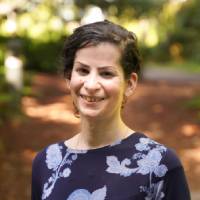Applied Critique
Coach House, Green College, UBC and livestreamed
Tuesday, January 21, 5-6:30 pm
Green College Special Lecture
 Meg Gibson is an associate professor in Social Development Studies and Social Work. Her work focuses on queer, trans and critical disability studies, feminist research methods, and the history and philosophy of social services. Current research explores the perspectives of Autistic people on "eloping" or departing suddenly from places; the ways in which people understand and use "neurodiversity" in their lives; and the experiences of diverse parents (particularly 2SLGBTQ+ and/or disability-identified parents) in meeting care and work responsibilities. She is an editor-in-chief of the journal Affilia: Feminist Inquiry in Social Work.
Meg Gibson is an associate professor in Social Development Studies and Social Work. Her work focuses on queer, trans and critical disability studies, feminist research methods, and the history and philosophy of social services. Current research explores the perspectives of Autistic people on "eloping" or departing suddenly from places; the ways in which people understand and use "neurodiversity" in their lives; and the experiences of diverse parents (particularly 2SLGBTQ+ and/or disability-identified parents) in meeting care and work responsibilities. She is an editor-in-chief of the journal Affilia: Feminist Inquiry in Social Work.
 Julia Bullard is an Assistant Professor at the School of Information. Her research examines how metadata and vocabulary design (mis)represents communities and their materials. Her ongoing work focuses on how terms related to identity are included and revised in library standards, how catalogues can more fully represent LGBT2QIA+ communities, and how community organizations create and sustain their own specialized vocabularies. She serves on the board of the Canadian Association for Information Science and the Subject Analysis and Access standing committee of IFLA.
Julia Bullard is an Assistant Professor at the School of Information. Her research examines how metadata and vocabulary design (mis)represents communities and their materials. Her ongoing work focuses on how terms related to identity are included and revised in library standards, how catalogues can more fully represent LGBT2QIA+ communities, and how community organizations create and sustain their own specialized vocabularies. She serves on the board of the Canadian Association for Information Science and the Subject Analysis and Access standing committee of IFLA.
 Hannah Kia is an Associate Professor at the School of Social Work. She is also affiliated with the Centre for Gender and Sexual Health Equity. Her current program of research addresses a variety of issues pertaining to sexual and gender minority (SGM) populations. In recent years, much of Hannah’s research has focused on the well-being of transgender and gender diverse (TGD) people. Drawing on intersectional scholarship and other critical traditions, she leads community-informed, applied inquiry intended to produce insight regarding varying inequities, expressions of resistance, and opportunities for mobilization that characterize TGD lives across axes of social location.
Hannah Kia is an Associate Professor at the School of Social Work. She is also affiliated with the Centre for Gender and Sexual Health Equity. Her current program of research addresses a variety of issues pertaining to sexual and gender minority (SGM) populations. In recent years, much of Hannah’s research has focused on the well-being of transgender and gender diverse (TGD) people. Drawing on intersectional scholarship and other critical traditions, she leads community-informed, applied inquiry intended to produce insight regarding varying inequities, expressions of resistance, and opportunities for mobilization that characterize TGD lives across axes of social location.
Unless otherwise noted, all of our lectures are free to attend and do not require registration.
January 21, 2025
9:00 am to 10:30 am
Coach House
6201 Cecil Green Park Rd